Awakenings: Art in Society in Asia, 1960s–1990s is a special international exhibition that illuminates the social, political, and cultural changes that occurred throughout Asia in the three decades from the 1960s to the 1990s and the subsequent changes in Asian contemporary art. Co-organized by National Museum of Modern and Contemporary Art, Korea, the National Museum of Modern Art, Tokyo, National Gallery Singapore, and the Japan Foundation Asia Center, more than four years of research have gone into the preparation of this exhibition. Featuring some 170 works by approximately 100 prominent artists from Korea, Japan, China, Taiwan, Hong Kong, Singapore, Malaysia, Indonesia, the Philippines, Thailand, India, Myanmar and Cambodia, this exhibition takes a comparative approach transcending national boundaries to introducing the dynamic qualities of avant-garde art in Asia.
From the 1960s to the 1990s, Asian societies experienced radical transformations brought on by decolonization, ideological conflicts rooted in the Cold War, the outbreak of the Vietnam War, the rise of nationalism, rapid modernization, and democratic movements. Through these turbulent times, artists were motivated to resist authority and customs and seek liberation from oppression. They led radical experimental art that challenged existing artistic concepts, categories, and institutions. Moreover, a new awareness of subjectivity and broad criticisms of Western modernism led to the emergence of various aesthetic experiments and movements that sought to escape "art for art's sake," understand art in relation to society, and bridge the gap between art and life. In this exhibition, "awakening" refers not to awareness through external intervention, but to the emergence of political awareness, new artistic attitudes, and a newfound sense of subjectivity that originated from a local and internal context.
Awakenings addresses the aesthetic radicalism that emerged from the geopolitical context of democratization, decolonialism, and anti-modernism, as well as the artistic trends that formed in the process throughout Asia, wherein art became a means of socio-cultural communication. The exhibition encompasses various artistic practices that sought to capture local stories through unconventional media, such as everyday objects, photography, installations, video, performance, and events. Radical and experimental artistic practices appeared at different times in each region, from the 1960s to 1970s in Korea, Japan, and Taiwan; from the 1970s to 1980s in Singapore, Malaysia, Indonesia, the Philippines, Thailand, India; and from the 1980s to 1990s in China.
Awakenings explores three themes: Questioning Structures, Artists and the City, and New Solidarities. With a comparative approach that transcends national frameworks, the exhibition highlights contemporary Asian art in terms of cultural interactions, visual and conceptual similarities and differences, and unexpected resonances across time and space. This approach draws a dynamic map of contemporary Asian art, encompassing its great regional diversity and complexity, and opening up new possibilities of reorganizing the narrative of art history, which is currently centered around Western art.
artists
Akasegawa Genpei, Amanda Heng, Apinan Poshyananda, Arahmaiani, Arakawa Shusaku, Brenda V. Fajardo, Chang Chao-Tang, Chang Sae-tang, Chen Chieh Jen, Cheo Chai-Hiang, Choi Minhwa, Choo Keng Kwang, Chung Chanseung, Datong Dazhang, Dede Eri Spria, Dir. Sashi Kumar, Ellen Pau, F.X. Harsono, Frog King Kwok, Green Team, Gulammohammed Sheikh, Ha Jonghyun, Hanaga Mitsutoshi, Hirata Minoru, Hong Sungdam, Hwang Jaihyoung, Imelda Cajipe-Endaya, Jim Supangkat, Joce Maceda, Jose Tence Ruiz, Julie Lluch, Jung Jungyeob, Jung Kangja, Kang Kukjin, Kim Bongjun, Kim Djinsuk, Kim Insoon, Kim Jungheun, Kim Kulim, Kim Yongtae, Koeh Sia Yong, Kudo Tetsumi, Kwak Dockjun, Lee Kangso, Lee Kunyong, Lee Seung-taek, Lee Ufan, Lim Mu Hue, Lim Ok Sang, Lim Yew Kuan, Lin Yilin, Matsumoto Toshio, Matsuzawa Yutaka, Min Joungki, Montien Boonma, Nakamura Hiroshi, Nakanishi Natsuyuki, Nalini Malani, Nick Deocampo, Nirmala Dutt Shanmughalingam, Noh Wonhee, Nomura Hitoshi, Oh Yoon, Pablo Baens Santos, Park Buldong, Park Hyunki, Pratuang Emjaroen, Provoke No.3, Quac Insik, Rajendra Gour, Redza Piyadasa, Renato Habulan, S. Priyanto, San Minn, Santiago Bose, Semsar Siahaan, Shin Hakcheol, Siti Adiyati, Song Dong, Sung Neungkyung, Svay Ken, Takamatsu Jiro, Tang Da Wu, Teo Eng Seng, THE PLAY, Tyeb Mehta, Uematsu Keiji, United Artists' Front of Thailand, Vasan Sitthiket, Vivan Sundaram, Wang Jin, Wang Jun-jieh, Cheang Shu Lea, Wen Pulin, Wong Hoy Cheong, Xiamen Dada, Yamashita Kikuji, Yang Maolin, Yoko Ono, Yun Suknam, Zero Jigen, Zhang Huan, Zhang Peili
